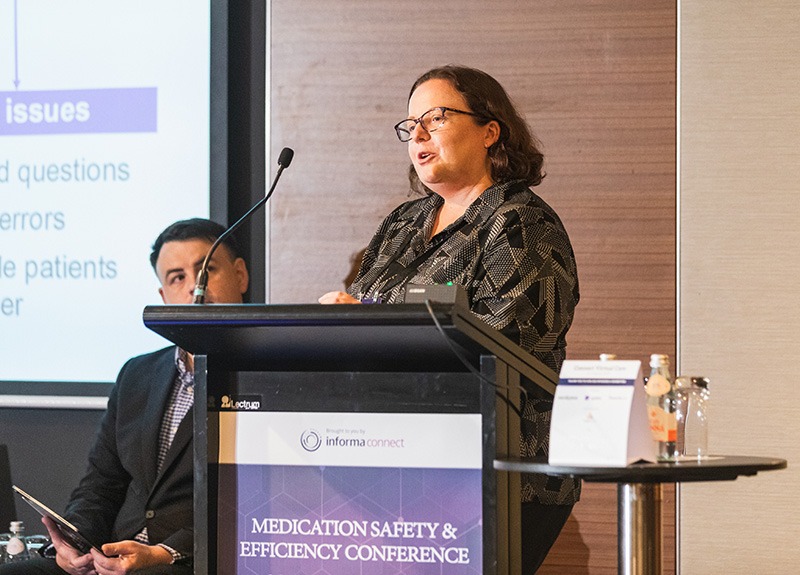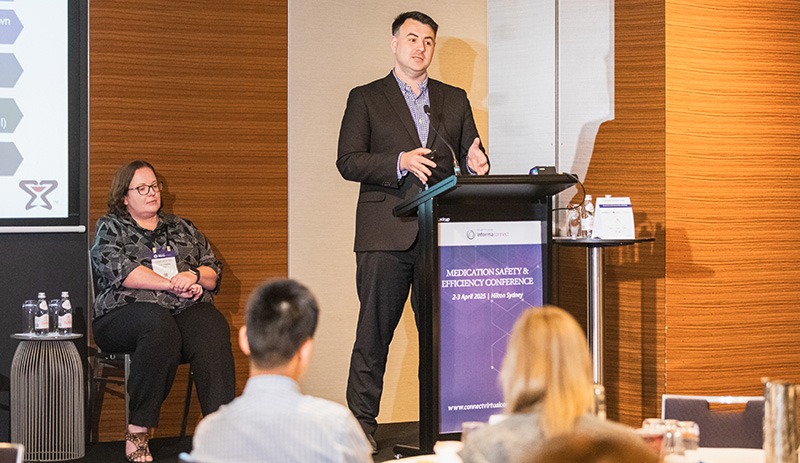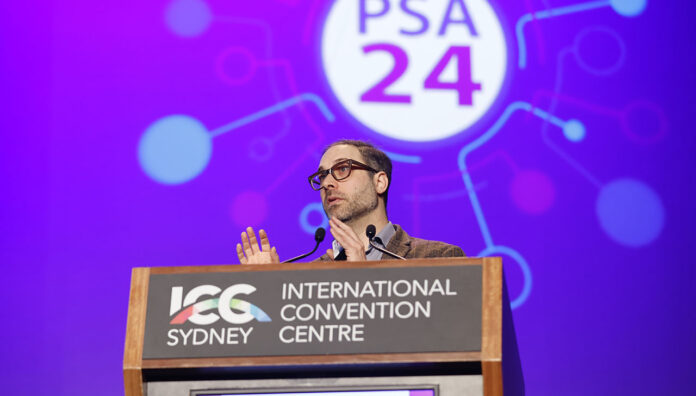About 3.5 million people are on antidepressants in Australia, for an average duration of 4 years. This makes Australia one of the highest users of antidepressants among Organisation for Economic Co-operation and Development (OECD) countries, said Dr Mark Horowitz in the session ‘The Maudsley Deprescribing Guidelines approach – the science of deprescribing psychiatric medicines,’ at PSA24 today (3 August).
Dr Horowitz almost died from severe antidepressant withdrawal effects, promoting him to to develop the Maudsley Deprescribing Guidelines due to a lack of evidence based guidelines on ceasing antidepressants.
Overprescribing of antidepressants in Australia makes these new guidelines a particularly useful tool.
‘Women are prescribed antidepressants more than men,’ he said. ‘Older people are prescribed [antidepressants] more than younger people, and in deprived regions, prescribing has also increased.’
While the Therapeutic Guidelines say that ‘discontinuation symptoms’ from antidepressants are usually mild and last 1–2 weeks, this description is based on short-term trials conducted by drug companies in the 1990s and 2000s.
However, after antidepressant use for 8–12 weeks, most people have mild and brief symptoms on cessation, said Dr Horowitz. ‘The longer people are on antidepressants, the harder it is to stop.’
What happens when people stop antidepressants?
In studies of patients who have been exposed to long-term antidepressants, changes to the serotonin system can be seen for up to 4 years after cessation, said Dr Horowitz.
‘So now what you have is physiological levels of serotonin [and] down-regulated serotonin receptors,’ he said. ‘Overall, you have reduced serotonin signalling in the system, [which is] something like hypo-serotonin syndrome.’
When patients present with symptoms that last several weeks, months or longer after stopping, prescribers will often say that it couldn’t possibly be because of the drug they’ve just stopped.
‘[But] the more tolerant you are to a drug, the more you get withdrawal [symptoms],’ said Dr Horowitz. ‘So although people sometimes claim that antidepressants don’t cause tolerance, of course they do.’
There is a ‘long list’ of antidepressant withdrawal symptoms that affect many different organ systems, including dizziness, headache, impaired concentration, depressed mood, irritability, anxiety, panic attacks, electric shock, brain zaps and suicidality.
‘We know these are withdrawal symptoms because they are detected even in people who are given antidepressants for reasons other than mental health problems [including] menopause, pain, and even healthy volunteers,’ he said.
Akathisia can also occur, which is still recognised as a long-term side effect of antipsychotic use, but can also occur when rapidly stopping antidepressants, benzodiazepines and other psychiatric medicines.
‘[People] are often pacing, restless and full of terror, and it’s a high risk of suicide,’ he said. ‘These people turn up to emergency departments. And because people are unaware that akathisia is a side effect of withdrawal, they’re [sometimes] diagnosed with psychosis, and given an inappropriate set of drugs to treat mental illnesses that are probably not relevant.’
One review found that about half of patients who stop antidepressants experience withdrawal effects, and about half of those report that the withdrawal effects are severe.
‘So that’s about one in four having severe symptoms,’ Dr Horowitz added.
How should tapering be approached?
The NICE Guidelines developed by the Royal College of Psychiatrists in the United Kingdom, published a few years ago, provide some broad principles on how to stop these medications, said Dr Horowitz.
‘People who are on these drugs for more than a few weeks should taper off over months or years [and] go down to very small doses before stopping, sometimes less than 1 mg, then go down in smaller and smaller size reductions,’ he said. ‘The rate should be adjusted to an individual’s ability to tolerate the process.’
The approach that makes sense is to reduce the dose in a way that reduces the effect on the brain. This method, called hyperbolic tapering, is featured in the Maudsley Deprescribing Guidelines.
‘There are a variety of licensed options, [including] cutting up tablets. Escitalopram also comes as a liquid in Australia,’ said Dr Horowitz. ‘There are also off-label options, such as compounding pharmacies who can make up capsules, tablets or liquids.’
Some people try to dose antidepressant medications every second day to try to get to smaller doses. But because most antidepressants have a half life of 24 hours or less, this can sometimes lead to severe withdrawal effects.
‘Switching to fluoxetine is often recommended …. it does have a longer half life, [but] it’s not a foolproof way of doing it,’ he added.
What about other psychiatric medicines?
The recommended tapering approach for antidepressants is also true for psychiatric drugs in general, said Dr Horowitz.
‘Opioids, benzodiazepines and Z drugs should be reduced in smaller and smaller amounts,’ he said. ‘The reason is, they have the exact same pattern of effect on the brain.’
With diazepam, reducing from 1 mg to zero produces a bigger change in effect on the brain than going from 100 mg to 75 mg.
‘The last few milligrams are the hardest to stop,’ said Dr Horowitz. ‘For all psychiatric drugs, going down by smaller and smaller amounts – being particularly careful at the end, and using things like liquids or smaller compounded tablets – can help [patients get] off all these different drugs.’
Hear more from Dr Mark Horowitz on the live PSA webinar The Maudsley Deprescribing approach – the science of deprescribing on 8 August 2024.



 Jess Hadley, community pharmacist and Professional Officer at PDL[/caption]
Jess Hadley, community pharmacist and Professional Officer at PDL[/caption]
 Peter Guthrey, Senior Pharmacist – Strategic Policy at PSA[/caption]
Peter Guthrey, Senior Pharmacist – Strategic Policy at PSA[/caption]


 Professor Margie Danchin[/caption]
Professor Margie Danchin[/caption]

 Dr Peter Tenni[/caption]
Dr Peter Tenni[/caption]
 How should we deprescribe gabapentinoids, according to the Maudsley Deprescribing Guidelines[/caption]
How should we deprescribe gabapentinoids, according to the Maudsley Deprescribing Guidelines[/caption]






